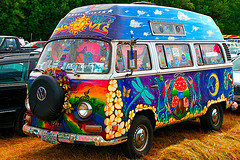Jan 30, 2011 Comments Off on Feelings
Feelings
There are so many ways to feel. And yet, we humans have the tendency to:
a) mistake the feelings that we have about a certain person, situation or object as the only proper feeling suited to said person, situation or object; and
b) assume that the way we feel at a particular moment—especially when we’re feeling “bad”—is the way that we are going to feel into the foreseeable future, possibly forever.
The fear or anxiety associated with this last assumption is, I believe, really the fear or anxiety that our present feeling is the last thing we will ever feel—as if, at the moment of death, whatever we were feeling would be both the single feeling that defined our lives as well as the sole feeling to accompany us throughout eternity.
Chogyam Trungpa said that feelings are just “heavy-handed thoughts.” I’ve often used these words to calm myself in moments of panic or dread (or, frankly, remorse). I also use them to understand this (irrational) insistence that any feeling is the only feeling.
When the horizon looms up, and we’re swallowed up by its shadow, recall that the lip of the Earth has not obliterated the sun, merely obscured it.
